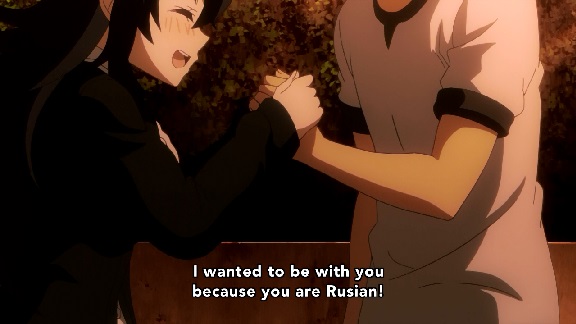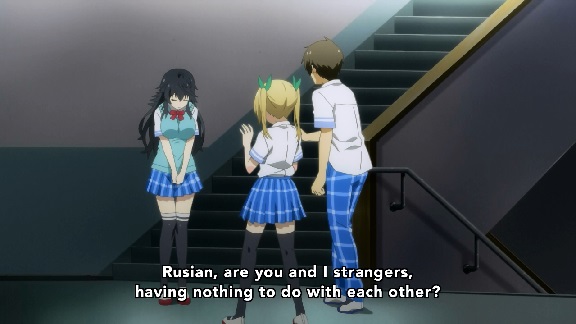Rebecca Silverman’s review of Netoge no Yome wa Onnanoko ja Nai to Omotta? seems to confuse comedic exaggeration for mental illness:
The problem really comes from Ako, the supposed heroine/love interest of the story. Simply put, she’s very annoying, but more at issue are the reasons why she’s annoying – Ako’s character is built on the idea that she cannot tell the difference between real life and the game. She insists on calling Hideki and the others by their game handles in school, persistently believes that she and Hideki are in an exclusive romantic relationship because they are “married” in “Legendary Age,” and she even occasionally attempts to access her game menu in real life. She’s clearly intended to come off as socially awkward and isolated, someone who can only find solace in the fictional world of the game where she doesn’t have to interact with people face-to-face, which is supported by her closed-off body language and persistent misinterpretation of her classmates’ efforts to befriend her. However, she presents more like someone who has a serious mental health problem, parasitically attaching herself to Hideki and ignoring his discomfort while occasionally exhibiting potentially dangerous behavior.
It’s something I saw a lot of when I went cruising for Love Hina fanfic having just completed the anime, where writer after writer took the slapstick violence poor Keitaro was subjected to and treated it literal. Now sometimes this was done deliberately, as in one story, where the writer looked at the Keitaro/Naru relationship as an essentially abusive one, but most often this seemed to be done unconsciously, as if the writers weren’t aware of the conventions of slapstick comedy. (Or choose to ignore them, to spice up a revengefic). Netoge no Yome wa Onnanoko ja Nai to Omotta? is a typical anime romcom, where each character’s flaws exaggerated for effect and just like how you shouldn’t apply romcom behaviour in real life, neither should you apply real life logic to a romcom.

Furthermore, this criticism misses the point completely about Ako. It’s not that she doesn’t understand the difference between online and “real life”; it’s that she explicitly refuses to. She fell in love with Hideki online and saw no reason to behave differently offline. Which is, as somebody who did the same, is perfectly understandable. I met and fell in love with my wife online and in my group of friends this is not a rare occurrence. The conflict that drives the series is Hideki has to adjust to the idea that the half serious, half jokey “marriage” he went into with Ako — when he still thought she was a dude roleplaying a girl — is actually serious to her. She loves him and the has to decide whether or not he can reciprocate that love.

All of which is brought as Ako needing to distinguish between on- and offline life better, but as noted the series starts to abandon that premisse in the second half. It’s more that she’s the classic type of antisocial nerd, not all that good at talking to people or making friends, coaxed out of her shell by the club members in general and Hideki’s growing love for her especially. Yet while Hideki keeps insisting that “the game and reality are separate”, this is constantly undermined by Ako equally persistent assertion that friendship and love in game do apply to the real world as well. If you love in the game, you love for real
Which is not to say that you can’t have issues with the way all this is portrayed, or worry that it could perhaps trivialise real world mental problems. But you do have to understand the genre conventions under which this series was working to understand its message.
No Comments